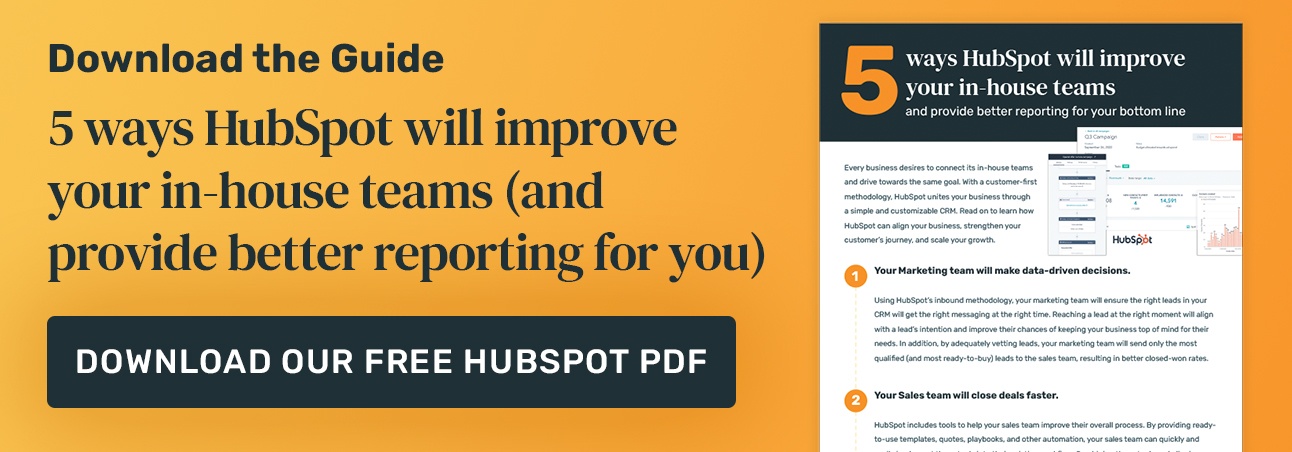HubSpot versus Salesforce: which is right for your business?

Are you in the process of finding a CRM (customer relationship management) system that suits your business needs? Or are you thinking about switching to a new one? We understand that the multitude of options available can be daunting, but we are here to help.
In this post, we will examine two of the leading CRM platforms, namely HubSpot and Salesforce, and provide an in-depth comparison of their features and functionalities. This will equip you with the knowledge to make an informed decision about which CRM platform is the perfect match for your business.
|
A CRM system centralizes customer interactions, providing insights into their needs, preferences, and behaviors. With the right utilization, CRM solutions like HubSpot or Salesforce drive targeted, automated, and personalized marketing, sales, and customer service. |
Assess your CRM needs
The CRM industry has seen rapid growth in recent years, increasing overall CRM usage from 56% to 74%. A recent MarTech survey reveals that 20% of businesses replaced their CRM platforms in 2022 so they could benefit from better features, better integrations, and cost savings.
Before you jump into purchasing a CRM solution like HubSpot or Salesforce, it's a good idea to take a step back and assess your business needs. This way, you can make sure you get the right solution that fits your specific requirements, and you won't waste valuable time or money.
To help guide your decision, consider asking yourself the following questions:
- Which CRM best fits the size of your business?
- Which CRM solution is best according to the nature of your business?
- How can you understand your customer base through the right CRM?
- What are the best ways to streamline your business processes with the ideal CRM solution?
By answering these questions, you can be sure to make an informed decision and find the right CRM solution for your business.
HubSpot vs. Salesforce
While both HubSpot CRM and Salesforce CRM are designed to focus on customer relationship management, their respective functionalities are unique and cater to different business needs. However, despite their differences, they share several common features. Here's a breakdown of the similarities and differences between the two popular CRM solutions.
Lead Generation and Management
HubSpot is a marketing, sales, and customer service platform, while Salesforce is a cloud-based CRM. Both systems can manage customer relationships, but HubSpot is more focused on marketing and sales automation, while Salesforce is more focused on customer service and support. Therefore, HubSpot places a greater emphasis on inbound lead generation. Salesforce is designed for more traditional sales and outbound marketing activities.
HubSpot
Inbound Marketing
HubSpot and Salesforce offer inbound marketing capabilities, including blogging, landing pages, and forms. However, HubSpot is considered the more comprehensive inbound marketing platform, offering a wider range of features and integrations.
For businesses looking for an all-in-one inbound marketing tool, HubSpot's plans offer a more comprehensive marketing bundle. For instance, HubSpot's pay-per-click (PPC) ad management feature allows you to create and manage PPC ads from within the platform, making it easier to manage multiple tasks in one place. Other features that come as part of the product bundles include:
- Page optimization suggestions
- Email and landing page templates
- Marketing automation
- Social media management
- A website and webpage builder
- Automatic site-wide SEO recommendations
On the other hand, Salesforce offers extensive marketing features, such as email automation, lead nurturing, AI capabilities, competitor monitoring, site page creation, and more. However, it's important to note that its marketing packages are priced separately from the CRM and start at $1,250 per month for up to 10,000 contacts.
HubSpot
Email Marketing
HubSpot CRM and Salesforce CRM have email marketing capabilities, including creating and sending email campaigns, tracking opens, clicks, conversions, and segmenting audiences. However, HubSpot offers more robust email marketing features, such as advanced personalization and automation options.
HubSpot
Social Media Management
Regarding social media management, HubSpot has simpler, more readily accessible marketing and content management features — such as content publishing automation, campaign management, social media monitoring, and more.
HubSpot
Marketing and Sales Automation
For marketing and sales automation, Salesforce leads the way.
Although HubSpot has some automation features, Salesforce uses an advanced social listening tool so teams don't need external applications to monitor conversations on social media and the web. Its Advertising Studio links CRM data with various marketing channels (ensuring that the correct message is delivered to the relevant lead at the appropriate time). Its Data Studio integrates data from different tools, giving marketing teams a clear picture of their success.
Salesforce
Analytics and Reporting
HubSpot and Salesforce offer analytics and reporting features, including real-time tracking and reporting on marketing and sales activities. However, Salesforce is generally considered the stronger platform in this area, offering more advanced analytics and reporting capabilities.
Salesforce
Ease of Use
HubSpot CRM is widely considered the easier platform to use because it has a more intuitive interface. Salesforce CRM is specially designed for complex and larger organizations, which means it has a much steeper learning curve.
HubSpot
Customer Service
HubSpot and Salesforce have similar customer services, including online support, phone support, and a wealth of online resources. However, HubSpot is considered the stronger platform since it offers more personalized and proactive customer support.
HubSpot
Integration
HubSpot CRM has made impressive strides in integrating other platforms in recent years, but Salesforce still offers more comprehensive (and customizable) options.
Salesforce
Scalability
Salesforce CRM is considered the more scalable platform, offering a wider range of features and integrations to support larger businesses. On the other hand, HubSpot is still growing. Since HubSpot is mainly designed for small and medium enterprises, it has limited scalability.
Salesforce
Customization
Salesforce CRM is the more customizable platform, offering a wider range of customization options and integrations.
HubSpot CRM strikes the perfect balance of power and usability, offering customization to meet business needs without adding complexity. It easily scales with flexible data structures and custom objects.
While highly customizable for complex organizations, Salesforce can become unwieldy with added data and processes, requiring more admin and developer resources to change and adapt over time. Despite its advanced forecasting and reporting, it may slow growth when businesses need to speed up.
Salesforce & HubSpot
Cost
HubSpot is the more affordable platform, with lower costs for basic packages and more flexible pricing options. Salesforce is the more expensive platform, with higher costs for basic packages and more complex pricing structures.
The estimated annual cost, including licensing, implementation, platform maintenance, software, and support for Salesforce, comes to around $230,000 for 50 users. While the same costs around $75,000 annually for 50 HubSpot users.
HubSpot
Best of both worlds: Integrate Salesforce into HubSpot
Integrating Salesforce into HubSpot can give businesses the best of both worlds by combining the strengths of both platforms and creating a more robust, streamlined solution. Some benefits of integrating Salesforce and HubSpot include:
Seamless Data Sharing
Integrating Salesforce into HubSpot allows businesses to share data seamlessly between the two platforms, eliminating the need for manual data entry and reducing the risk of errors. This can improve data accuracy and provide a more comprehensive view of customer interactions and activities.
Increased Efficiency
By integrating Salesforce into HubSpot, businesses can streamline their sales and marketing processes, eliminating the need to switch between multiple systems and reducing the time and effort required to manage customer interactions. You can use HubSpot for the best marketing and content management experience, while integrating with Salesforce will allow you to make the best of sales management.
Better Data Insights
Integrating Salesforce into HubSpot gives businesses more comprehensive data insights, including real-time tracking and reporting on marketing and sales activities. This can help you make more informed decisions and improve overall performance.
Increased Sales and Marketing Alignment
The HubSpot-Salesforce integration works in both directions, so any information recorded on one platform is visible on the other. Every click-through action, form submission, email opening, and marketing campaign note can help the sales team close a sale more quickly and boost revenue.
Final Thoughts
As you can see, choosing the right CRM solution can have a significant impact on your business's success. So, before making a purchase, it's crucial to carefully consider your business's specific needs and priorities. Investing in a CRM that doesn't align with your objectives will only result in wasted resources. This is why many businesses are opting to switch their CRM systems in 2022.
When it comes to HubSpot CRM vs. Salesforce CRM, both have their strengths and weaknesses. HubSpot is great for inbound marketing, email marketing, and social media management, while Salesforce is more suitable for sales-led companies due to its robust sales automation, analytics and reporting, customization, and scalability features. Ultimately, the CRM solution that's best for your business depends on your unique requirements.
In summary, if you're a small or medium-sized business, HubSpot CRM could be the perfect choice for you. For larger organizations, Salesforce may be the ideal CRM solution. To determine the most suitable option, remember to start by assessing crucial factors such as essential features, number of contacts, and number of users.
If you're interested in learning more about our HubSpot implementation and maintenance services or need help deciding which CRM solution is best for your business, please don't hesitate to contact us. We're always here to help!
March 8, 2023
